‘Dune’ and Human Potential
Gregory Hood, American Renaissance, December 17, 2021

Credit Image: © Villeneuve Films/Entertainment Pictures/ZUMAPRESS.com
Dune is a great movie, and director Denis Villeneuve has filmed what some called an “unfilmable” story. YouTube commentator “Morgoth’s Review” calls the book a “reactionary masterpiece” and adds that conservative views of Dune say more about the reviewer than anything else. If so, then this may be more about me than the movie, but I think these themes speak to everyone.
Dune is about great issues, so both progressives and conservatives can justify their own interpretations — the mark of a great work. Unfortunately, unnecessary elements in the film about contemporary American racial politics jar the viewer out of absorption. Dune has become yet another battleground in America’s tiresome victimhood competition. Still, there’s a great deal of value.
Dune’s universe is too sprawling to explain without its own essay, but to make it simple, in the far future, mankind is governed by a vast Imperium. The Padishah Emperor, backed by his ruthless Sardaukar forces, is limited in his power by great feudal houses. A guild of “navigators” makes swift travel across the interstellar empire possible, but its members need a chemical called “spice” in order to use their powers. Spice is found on just one planet, Arrakis, known as “Dune,” which is governed by the ruthless Baron Harkonnen. The emperor has ordered House Atreides to take over from the evil Harkonnens. This seems like a windfall for House Atreides, but it is a trap, and the Duke Leto Atreides knows he is walking into it.
Why does he do it anyway? The duke will not stain his honor by defying an imperial command. And he has other motives. The ancient population of Arrakis, the “Fremen,” could be a powerful ally and give the house the “desert power” it needs to fight on Dune. Harkonnen oppression has also given the Atreides a chance to prove they are different and to win over the indigenous Fremen.
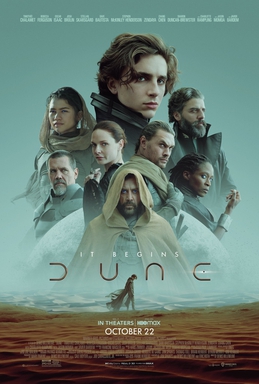
There is also an organization called the Bene Gesserit, a female religious order that cultivates mysterious powers, advises the imperial court and the great houses, spreads religious myths to protect its members, and works for its own interests. It’s like the Jesuits. Its long-term plan is to breed a superior human, the “Kwisatz Haderach,” a term from Hebrew that means “contracting the path.” This superman would be able to see the past, predict the future — and be easily managed by the sisterhood. Duke Leto’s concubine Jessica, the mother of his heir Paul, is a member of the sisterhood. She is independent enough to give her duke a male heir instead of a daughter as the sisterhood ordered. However, she’s still enough of a sister to guard the door while her sister superior gives her son a potentially deadly test.
The Atreides invade Arrakis (Dune) and have a promising beginning with the Fremen. However, the Harkonnens attack more quickly than the Atreides anticipated. Reinforced by Imperial Sardaukar and helped by a traitor, the Harokonnens wipe out the Atreides. The now-Duke Paul and his mother escape into the desert and win a place among the Fremen. Dune the movie ends here, but readers of the book series know that later, Paul becomes the leader of the Fremen and wages an insurgency that wins him the Imperial Throne.
Why would traditionalists, conservatives, or people interested in race care about Dune? First, it rekindles the prospect of human greatness. The war leads to a ban on artificial intelligence. Instead of relying on computers, humans must develop their compacities. Specially trained humans, “mentats,” replace computers; the powerful learn to manipulate others; and warrior aristocrats risk their lives to hold their positions. The Fremen respect strength, honor, and tradition. Aristocrats govern through personal courage, combat, and skillful governance. Personal shields make weapons like guns or lasers ineffective, so personal combat has returned. A semi-feudal system re-emerges. People who cannot depend on machines must improve themselves through training and breeding.
Dune is also about genetics, science, and religion. The sisterhood is largely a eugenic society. Early in the film, a “Reverend Mother” tests Paul to see if he is human or just an animal by judging his self-control in the face of extreme pain. The sisterhood deliberately seeds myths for its own ends, and its prophecies become self-fulfilling. Even the protagonist Paul, a character with extraordinary power, finds he can’t stop a holy war waged in his name. Dune raises questions about what defines a people and evokes the relationship between religion, race, and IQ. Paul has powers that are essentially “magical,” so religion is real in some way.
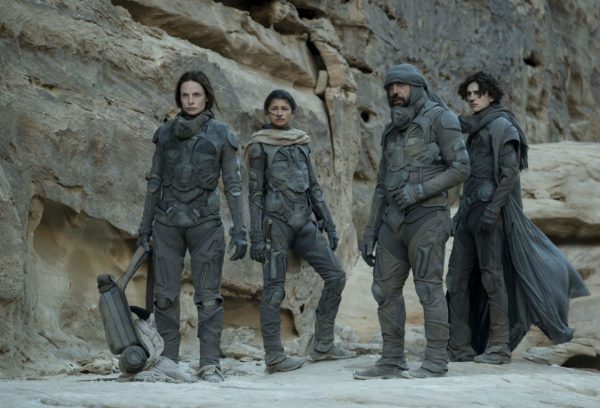
Credit Image: © Villeneuve Films / Entertainment Pictures / ZUMAPRESS.com
Finally, Dune shows that a higher purpose is more important than money. One subplot largely ignored in the film is the importance of the guild and the directorate that handles profits from spice. The book explores the consequences of the enormous wealth spice can bring. Today, international finance is an obstacle to white interests and denies dissidents basic services. A victory of tradition over money is an attractive message for today. The “hard times make strong men, strong men create good times” concept is also part of the story, with the Fremen becoming powerful warriors because of where they live.
What of race? It is 10,000 years in the future, so circumstances are different. It’s more useful to think about men of race instead of race generally. The Atreides line traces its founding to Agamemnon. Superior humans research their own history, and the Bene Gesserit sisterhood deliberately tries to breed different strains together. Blood is even more important than was in feudal Europe because certain people can sense the blood memory of their ancestors. Paul speaks of a “race consciousness” that is using him as a tool to lead religious and military movements to serve a sacred yet scientific evolutionary impulse. Nature, breeding, and discrimination have returned.
The book’s author Frank Herbert drew heavily on Islam. As allegory, the religious “Fremen” are Arabs, the great houses are the Western powers, and the “spice” is oil. The idea of a “voice from the outer world” — a white man who could lead the Arabs to their destiny — has been a popular concept since Lawrence of Arabia and World War I.
However, the book is far broader, so progressives find other messages. Ecology, skepticism about “great men,” and anti-colonialism are themes that appeal to them. The idea that strong warriors are formed entirely by their environment denies race. The Fremen are strong because they live on a hellish world, not because they have special gifts.
Unfortunately, America today is dominated by the search for racism, so the movie has racial messages. The evil, perverse Harkonnens are all pasty white. The Atreides are mostly white, with the occasional non-white among its officers, but clearly a white, colonial power. Duke Leto, played by Oscar Isaac (by appearance, a light Hispanic), is white, his concubine Jessica is white, and Paul is played by Timothée Hal Chalamet, perhaps best known for playing Henry V in The King. His house is relatively honorable, but the Fremen, the “indigenous” people of Dune, still see them as colonizers. The movie begins with actress Zendaya Coleman (faintly black, and known as just “Zendaya” professionally) asking the audience who the next “oppressors” will be. Of course, humans have traveled to other planets, so it would be hard to say anyone is truly “indigenous.”
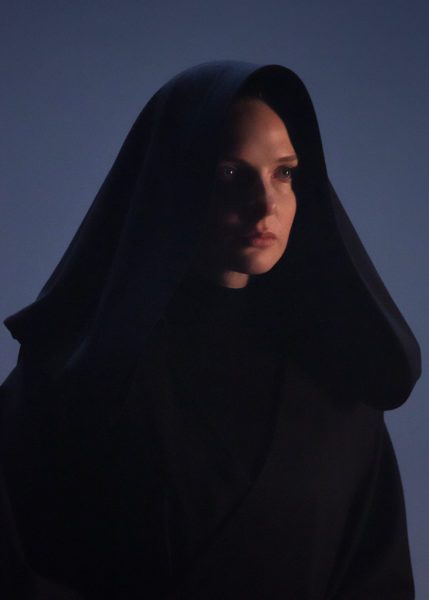
Rebecca Ferguson as Jessica. (Credit Image: © Villeneuve Films / Entertainment Pictures / ZUMAPRESS.com)
In the film, the Fremen are all brown and black, including black Africans, but they are led by Stilgar, played by Javier Bardem, who is mostly white. Dr. Liet Keynes, the “planetologist” and imperial servant who fuels the Fremen’s dream of transforming Arrakis into a lush, water-rich planet, is made into a black woman in the movie. Rather than being the menacing, legendary figure of the book who rules the Fremen by force of personality and scientific knowledge, Dr. Keynes is now a mystic. We get no sense of the character’s importance or the depth of his (now her) dream of terraforming the planet.
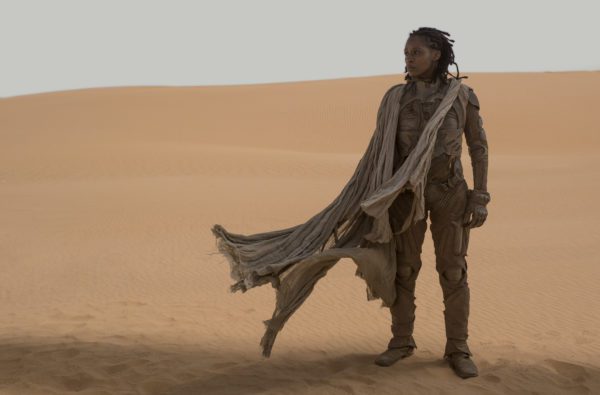
Sharon Duncan-Brewster as Liet-Kynes. (Credit Image: © Villeneuve Films / Entertainment Pictures / ZUMAPRESS.com)
Zendaya, who appears as an ethereal vision for most of the movie as Paul’s future love, represents an ideal of authenticity. Her role consists mostly of whispering Paul’s name and staring into the camera, so it’s hard to separate the character from the actress Zendaya, a BLM-supporting celebrity whose music (“pretty like Beyonce, big time like Kanye, Imma rock out, rock you like Green Day”) celebrates becoming part of the all-consuming nothing that is pop culture. This almost custom-made persona is why she has such an enthusiastic personal following, and her lack of screentime in the movie is a major controversy.
From the perspective of 2021, the fault lines are clear: We have the extra-evil, extra-white Harkonnens, the condescending whites of House Atreides, the all-white Sardaukar, and the boy who would be Emperor learning the deep wisdom of indigenous people about the environment, spirituality, and love. It is after the young duke essentially becomes a Freman that he can return to the Imperium with his non-white army, claim the throne from the white ruling class, and reshape the empire for the Fremen. A bloody jihad, which even Paul can’t stop, will bring “social justice” to other planets. While Paul fears the jihad (about 61 billion die in future books in the Dune series), he recognizes it is part of “race consciousness” for humans to “mingle their genes.” The carefully bred white superhuman has a mission of miscegenation. We can see this as a white liberal’s power fantasy, similar to that of Daenerys in Game of Thrones.
Of course, there’s no reason why a group people shaped by an extreme environment thousands of years from now would be any particular race beyond who the first settlers were. We also clearly see high-ranking blacks in the Imperium, so there’s no “racism,” beyond preserving certain bloodlines. The racial justice seems forced.
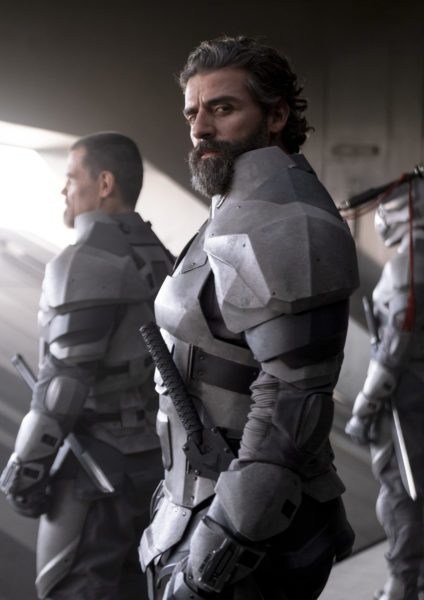
Oscar Isaac as Duke Leto Atreides. (Credit Image: © Villeneuve Films / Entertainment Pictures / ZUMAPRESS.com)
Fremen can’t or won’t drive out the Harkonnens until they are led by Paul, their messiah from another world. Religiously, the Fremen combine Zen-Buddhism and Islam, though they have myths that were implanted in their culture by the women of the Bene Gesserit. Fremen are brave and strong, but not politically sophisticated enough to seize power on their own. Thus, even a film that sets up a non-white liberation myth is a problem for critics, because it’s a white guy who leads them to freedom.
- Is Dune a White Savior Narrative? by Ali Karjoo-Ravary, Slate, October 26, 2021
- Maybe Dune, a story about a White Superman Created by a Eugenics Program, is Not the Film We Need Right Now, by Paul Sturtevant, September 16, 2020
- Here’s how the Dune sequel can fix the first movie’s white saviour problem, by Rukhsar Ali, CBC, November 2021
The novel’s popularity in reactionary circles also worries critics.
- Race Consciousness: Fascism and Frank Herbert’s “Dune,” by Jordan S. Carroll, Los Angeles Review of Books, November 19, 2020
- ‘Dune’ May Be Fascist, but Its Focus on Islam Is Groundbreaking, by Ofri Ilany, Haaretz, November 2021
- Why Dune endures, by Alissa Wilkinson, Vox, October 22, 2021
The last article complains that author Frank Herbert’s “personal politics were complex and often reactionary,” adding that he was racist. Who isn’t? Still, the overall thrust of the Dune series is not a Luke Skywalker style “hero’s journey,” in which Paul avenges his family and becomes a just ruler. Instead, Paul sets in motion monstrous events he can’t control, and shies away from a sacrifice that would save humanity. However, if you don’t read the rest of the series — and many don’t — you won’t know that.
The racial politics will become more important in the sequel. The first film was about the somewhat Eurocentric Imperium while the sequel is about the Fremen. We will see Paul and his mother become part of the Fremen and lead them. Paul knows this. Zendaya’s “Chani,” his future lover, greets Paul with the words “you look like a little boy,” so we’ll probably see some of the casual, anti-white putdowns typical of a movie like Black Panther. There will also be the predictable fashion of the white hero learning spiritual wisdom from the more “authentic” non-whites. The idea that the white leaders can learn wisdom from the non-whites and so recreate their culture reminds one of Michel Houellebecq’s novel Submission, in which Islam revitalizes a dead Europe by letting it shed its guilt. Paul’s vision of his mother as a tribal “reverend mother” is typical.

Zendaya as Chani. (Credit Image: © Villeneuve Films / Entertainment Pictures / ZUMAPRESS.com)
The Dr. Keynes of the book was a scientist who won over the Fremen with his dream of terraforming Arrakis and his powerful personality. In the film, we have a black woman who is essentially a victim, who loved and lost a Fremen, went native, and dedicates herself to Shai-Hulud, the giant sandworms on Dune. The character’s importance (arguably the real “white savior” of the Fremen) is gone.
Still, that’s one of the film’s few missteps. Unlike David Lynch’s 1984 version, this Dune shows us the world instead of telling us about it. Its spaceships, architecture, and aesthetics are reminiscent of the best aspects of 1920s futurism and modern revivals. The Sardaukar falling from the sky in silence to bring death is like something out of a nightmare. Fewer shots of characters staring pensively into the distance might have given us more scenes that show politics, but the film wisely cuts many subplots.
Dune is archeofuturist and this has a certain forbidden appeal in liberal democracy. In our system, status competition is more intense and less dignified and courageous than noble houses fighting declared war against each other but bound by certain conventions. The ideal of pursuing human greatness by fully developing the body and mind is explicitly inegalitarian.
Some leftists have argued that Dune is about fearing power and warning against charismatic leaders. However, the idea of being caught up in cycles of history is a traditionalist idea. Opposition to central authority or messianic saviors is stronger on the American Right than the American Left, which until recently was selling devotional candles of Robert Mueller. Besides, even if a book is “supposed” to be progressive, sometimes the authors get it wrong. If Dune is meant to be critical of tradition, it fails just as Starship Troopers failed, by inadvertently making tradition look better than what we have now.
In future books, Paul’s son accepts the mantle Paul couldn’t, and becomes prescient, almost divine, and rules as “God-Emperor” for thousands of years. However, this is meant as a sacrifice, not tyranny. Eventually, the “Golden Path” he steers humanity towards frees it from any possibility of central control. He sacrifices his reputation and life for this. True diversity really is strength when domination by one “correct” point of view is impossible. Today, when we are denied freedom of speech or access to services because of our views, the idea of being beyond any central control is attractive.

Timothee Chalamet as Paul Atreides. (Credit Image: © Villeneuve Films / Entertainment Pictures / ZUMAPRESS.com)
The real reason white advocates should see Dune (and read at least the first book) is to see a future that is run by humans who have become more than human, who treasure family and lineage, and who live for honor rather than victimhood. The most noble ruling house is run by warrior-poets, who know philosophy, holy texts, and military strategy. Dune does speak to something in the blood, that odd feeling of “life reaching beyond itself,” a message most recently popularized by the pseudonymous author of Bronze Age Mindset.
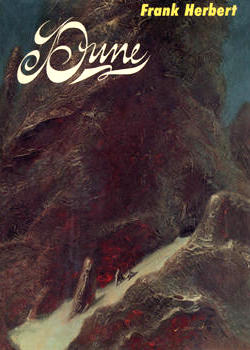
Cover of the first edition of the novel.
Whites can see a world in which Western Civilization (symbolized by the House Atreides descended from the ancient Greeks) continues. We ponder the question of whether an exhausted formal tradition can be overturned by a more vital faith from outside if we can’t summon strength from within. We are also reminded of the costs of decadence and weakness, and that a people must remain hard and strong to survive. Finally, we see a message that is anti-egalitarian and values freedom. The “Golden Path” leads to a world in which no one can tell everyone what he is allowed to think or write. The book is also fun to read; if not a literary classic, it ranks well above cheap thrillers and may stimulate an interest in history, religion, and political philosophy.
The negative side of this movie — perhaps my only real objection — is that it crowbarred in contemporary racial dynamics. There’s no reason to make Dr. Kynes a black woman. The theme of the noble, non-white, wise “native” oppressed by fat, immoral whites is just under the surface, like one of Dune’s giant worms. The next film could be far worse, larded with even more of America’s painfully hypocritical and stupid racial orthodoxy. Paul’s role as “white savior” will mean that even as the film implicitly smears whites, non-whites will still feel like victims.
Still, we can’t complain about a culture that others control. The system that made Dune is the one that rules the culture in which we are trapped. We can take what lessons we can from it and create our own subculture — eventually to become a dominant culture.
Simply as a movie, Dune is brilliant, with a powerful supporting cast. It’s a real film, not a Marvel farce with ham-handed cues to tell young boys when to laugh or feel forced emotions. That’s rare in the age of Netflix. Dune, like the book, ditches irony and detachment, and plunges into its themes. Stylistically, it’s a joy to watch.
Dune is about human greatness, and that is more inspiring than just saving our people as a biological entity. We really are the people that acts with a kind of divine madness that drives us to the heights of conquest, adventure, and exploration. The idea of training one’s body and mind to perfection to defend your loved ones is thrilling and inspiring. At the same time, Dune reminds us that we are part of a line greater than ourselves even as we pay for the sins of our ancestors, and that we cannot always defy fate. The best we can do is be strong, even to the point of seeking out hardship.
A good book or movie shouldn’t just make you think, but make you want to be better. It’s hard to watch Dune and not feel challenged somehow to prove you are human, not just an animal. Like Duke Leto, we are surrounded by foes and traitors, face total extinction, and are in many ways trapped by the system we ourselves helped build. Paul’s strategy of revolution from the periphery, both culturally and militarily, has lessons for us. Building something on the periphery that’s better, stronger, and more fulfilling than the system is part of the answer. Dune isn’t just a faithful and inspiring recounting of a great book, but a challenge. Anything that can drive people to act, build, and create is something to support, even if it means giving Hollywood a few more dollars.















